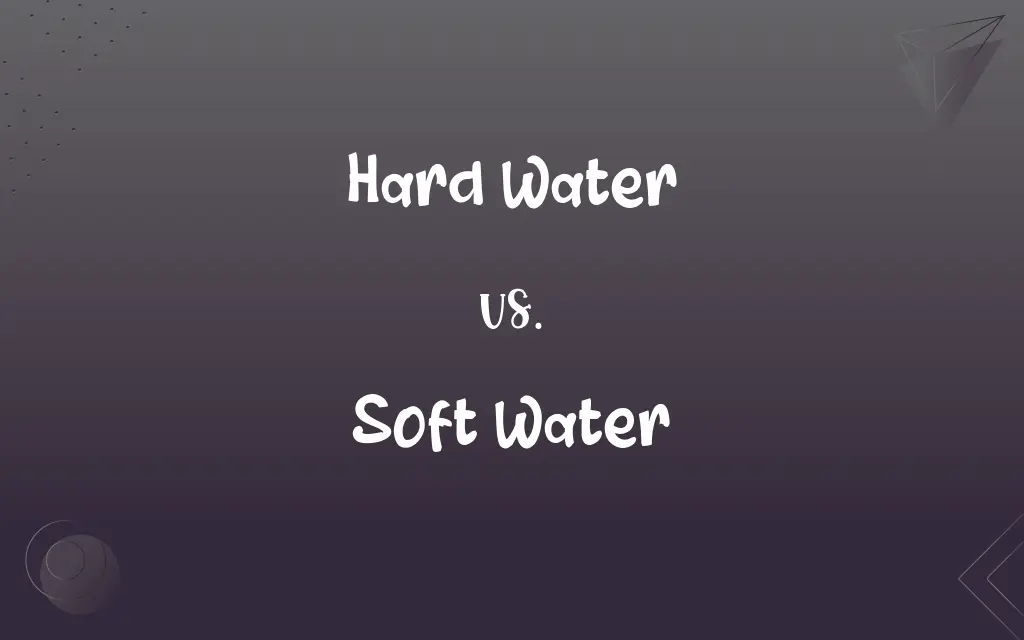Hard Water vs. Soft Water: What's the Difference?
Edited by Janet White || By Harlon Moss || Updated on October 26, 2023
Hard water contains high mineral content, especially calcium and magnesium; soft water contains low mineral content.

Key Differences
Hard water is water that has high mineral content, primarily calcium and magnesium. This mineral content can be the result of water passing through deposits of limestone and chalk. Soft water, on the other hand, has low concentrations of these minerals. It's often the natural state of rainwater and can also result from water treated to remove these minerals.
Hard water often leaves mineral deposits behind, which can be seen as scale on appliances and fixtures. This scaling can clog pipes and reduce the efficiency of water heaters and other appliances. Soft water, conversely, does not leave these deposits, making it better for preserving the life of appliances and reducing maintenance costs.
In the realm of personal care, hard water can cause soap to not lather well, often leaving a filmy residue on the skin and hair. This can lead to dry skin and dull-looking hair. Soft water allows soap to lather easily and rinse off cleanly, leading to smoother skin and shinier hair.
When it comes to cleaning, hard water can cause spots on glassware and dishes, and may require more detergent for effective cleaning. Soft water reduces the need for extra detergent and can prevent spotting, resulting in cleaner dishes and laundry.
Hard water can have a distinct taste due to its mineral content, which some people may find unpalatable. In contrast, soft water often has a more neutral taste, although if overly softened, it might taste slightly salty.
ADVERTISEMENT
Comparison Chart
Mineral Content
High in minerals, especially calcium and magnesium.
Low in minerals, especially calcium and magnesium.
Effect on Appliances
Can cause scale buildup, reducing appliance efficiency.
Does not cause scale buildup, prolonging appliance life.
Lathering with Soap
Causes soap to lather poorly and can leave a residue.
Allows soap to lather easily and rinse cleanly.
Taste
May have a distinct mineral taste.
Typically has a neutral or slightly salty taste if overly softened.
Cleaning Efficiency
Can cause spotting on dishes and may require more detergent.
Prevents spotting and reduces the need for extra detergent.
ADVERTISEMENT
Hard Water and Soft Water Definitions
Hard Water
Water that may not lather soap effectively, leading to residue.
My soap doesn't lather well because of the hard water.
Soft Water
Water that's typically gentler on appliances and plumbing.
Our appliances last longer since we switched to soft water.
Hard Water
Water that can require more detergent for effective cleaning.
Laundry is challenging here because the hard water demands extra detergent.
Soft Water
Water with low mineral content, especially low in calcium and magnesium.
The soft water makes my hair feel silky after washing.
Hard Water
Water with a high content of dissolved minerals, particularly calcium and magnesium.
The hard water in our area is causing buildup in our pipes.
Soft Water
Water that reduces the need for additional detergents during cleaning.
I use less detergent with soft water.
Hard Water
Water that may have a distinct mineral taste.
The hard water from the tap tastes different from bottled water.
Soft Water
Water that may have a neutral or slightly salty taste if overly softened.
The soft water from our system tastes a bit salty.
Hard Water
Water that can cause scaling on appliances and fixtures.
We had to replace our kettle due to hard water deposits.
Soft Water
Water that allows soap to lather easily and rinse cleanly.
With soft water, my dishes always come out spotless.
FAQs
What is soft water?
Soft water contains low mineral content and is often treated to remove calcium and magnesium.
Can hard water damage appliances?
Yes, hard water can cause scale buildup, which can reduce appliance efficiency.
Does hard water affect hair and skin?
Yes, hard water can cause soap to lather poorly, leaving a residue on skin and hair.
Does soft water require less detergent for cleaning?
Yes, soft water reduces the need for extra detergent during cleaning.
What is hard water?
Hard water contains high mineral content, especially calcium and magnesium.
Does soft water prolong appliance life?
Yes, soft water doesn't cause scale buildup, so appliances often last longer.
Is hard water naturally occurring?
Yes, hard water can be a result of water passing through deposits of limestone and chalk.
Can soft water taste salty?
Yes, if water is overly softened, it might taste slightly salty.
Can hard water cause spots on dishes?
Yes, hard water can cause spotting on dishes and glassware.
Does hard water affect laundry?
Yes, hard water may require more detergent and can cause fabrics to feel stiff.
How can one test for hard water at home?
A common method is the soap test, where soap is shaken with water; if it doesn't lather well, the water might be hard.
Is soft water the natural state of rainwater?
Yes, rainwater is naturally soft water as it has low mineral content.
Does boiling make hard water soft?
Boiling can precipitate calcium carbonate out of the water but won't remove all hardness-causing minerals.
Are there advantages to hard water?
Some people prefer the taste of hard water, and it can provide essential minerals like calcium and magnesium.
Is soft water better for washing?
Yes, soft water allows soap to lather easily and rinse cleanly.
How can hard water be softened?
Hard water can be softened using a water softener that replaces calcium and magnesium ions with sodium or potassium ions.
Are there health implications of consuming hard water?
Hard water is generally safe to drink, but an excessive intake of certain minerals might have health implications for some people.
Does soft water benefit skin and hair?
Yes, soft water can lead to smoother skin and shinier hair by allowing soap to rinse off cleanly.
Can soft water corrode pipes?
Extremely soft water can be slightly corrosive, which might affect copper pipes and fittings.
About Author
Written by
Harlon MossHarlon is a seasoned quality moderator and accomplished content writer for Difference Wiki. An alumnus of the prestigious University of California, he earned his degree in Computer Science. Leveraging his academic background, Harlon brings a meticulous and informed perspective to his work, ensuring content accuracy and excellence.
Edited by
Janet WhiteJanet White has been an esteemed writer and blogger for Difference Wiki. Holding a Master's degree in Science and Medical Journalism from the prestigious Boston University, she has consistently demonstrated her expertise and passion for her field. When she's not immersed in her work, Janet relishes her time exercising, delving into a good book, and cherishing moments with friends and family.































































